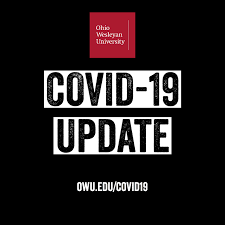Azmeh Talha
Editor
Hailey de la Vara and Caitlin Jefferson
Transcript correspondents
Just three days after Ohio Wesleyan University’s 178th birthday, the campus suspended all in- person classes in response to the continued spread of COVID-19, which was officially named a pandemic by the World Health Organization Wednesday.
OWU President Rock Jones announced the two-week class suspension in a campus-wide email Tuesday, just after 9 p.m. It will be the longest closure since the 1913 flood, which shut down OWU for at least a week, said Eugene Rutigliano, the digital initiatives librarian and curator of the OWU Historical Collection.
 The decision came in the wake of recommendations from the Ohio Department of Health and Ohio Gov. Mike DeWine, who asked all Ohio colleges to suspend face-to-face classes.
The decision came in the wake of recommendations from the Ohio Department of Health and Ohio Gov. Mike DeWine, who asked all Ohio colleges to suspend face-to-face classes.
Classes will continue at OWU by digitally remote teaching methods at the end of an extended spring break, beginning March 18 through Sunday, March 29, Jones said in the email. The university also closed the Simpson Querrey Fitness Center, Morrill Family Stength & Conditioning Room and Meek Aquatics and Recreation Center.
All events have been canceled, except athletic events, through March 29. Spectators will be permitted at outdoor competitions but barred from indoor athletic events. OWU offices will remain open for business.
Dale Brugh, OWU’s associate provost, said the unprecedented closure will create challenges for both faculty and students.
“I suspect that most faculty do not like the idea of remote classes and prefer face-to-face classes, but they are rising to the challenge,” Brugh said. Earlier in the day, Brugh sent faculty an email urging them to meet this difficult test head on.
“There are many things for all of us to learn. Please give yourself and others permission to be novices,” the email said. “We all need to start from where we are, learn something new, and move forward. Our students are depending on us to help them through this time.”
The university’s senior leadership is assessing the situation to ensure that remote teaching will work in a manner that benefits the college community, Brugh said.
The university has established a COVID-19 information webpage and in the coming days will announce an FAQ page to answer questions students may have. Meanwhile, OWU sent out a survey to gauge the technological capability of faculty, even as the Information Services office prepared to offer faculty technology workshops on Monday and Tuesday.
Having easy access to 21st century technology should keep teaching and learning moving forward, said Lee Fratantuono, an OWU classics professor.
“While nothing can replace in-person classroom experiences, thanks to the reality and wonder of contemporary technology, remote instruction is both possible and practical in challenging circumstances like those that confront us in March,” he said.
Nonetheless, uncertainty exists for some faculty and students.
Sean Kay, a professor of politics and government, called the class suspension a wise move and while he does not anticipate issues, others may have some difficulties.
“I am familiar with platforms like Blackboard, which work well for lecturing,” Kay said. “I worry about my science friends who have labs and so on.”
Tom Wolber, a professor of foreign languages, said the current situation is headed into unfamiliar terrain.
“I have no idea of what online means,” Wolber said. “Do we teach students individually or collectively? And how will students be tested? None of this has been determined. This is uncharted territory.”
Some students like senior Sophia Ahmed, from Pakistan, also worry about where things are headed. She said she has only heard from one professor who encouraged her to stay positive.
“I think e-learning might be a challenge, but hopefully it won’t have an impact on my studies,” Ahmed said. “It might affect studies to a certain extent since certain classes are easier to take in person rather than online.”
Meanwhile, students, faculty and staff who traveled over spring break were asked to complete a travel registry form, and anyone scheduled to participate in future OWU-sponsored travel must seek approval.
Some students returning from break are still trying to work out whether to remain on campus or return home. President Jones’ email Tuesday “strongly encouraged” students to remain at home or return home after break, but also said if they stayed they would have to register for housing.
Jones, on Wednesday, said while he does not know how many students will remain on campus, he suspects many, if not all, international students will.
It’s a dilemma for some, even including those from the area, like junior Jessica Blankenship.
“I’m feeling a bit anxious about this whole situation. I’m not sure if I’m going to stay home or go back to campus because most of my school books are back in my dorm,” she said. “I’m really not sure how this will affect my studies since we only have less than two months left for the semester.”
Sophomore Jillian O’Hara said she is worried about her classes.
“I think it will impact some of my studies because a lot of my classes are discussion based,” she said. “A few of my professors have reached out saying that they will keep us updated . . . but we will have to figure out how to get our books.”
Sophomore Mackenzie O’Brien said she feels anxious because so much panic is linked to the virus, so she will remain at home.
“I am staying at home but only because they are strongly urging us not to come back to campus … and I do live close,” O’Brien said. “I am nervous about how my classes will adjust.”
Some, like OWU senior Jack Cherry, think the changeup in teaching methods will have little impact.
“The break doesn’t really affect me whatsoever,” he said. “I’m still going to focus on academics. The only thing that changes is the fact that I won’t attend class with people.”
